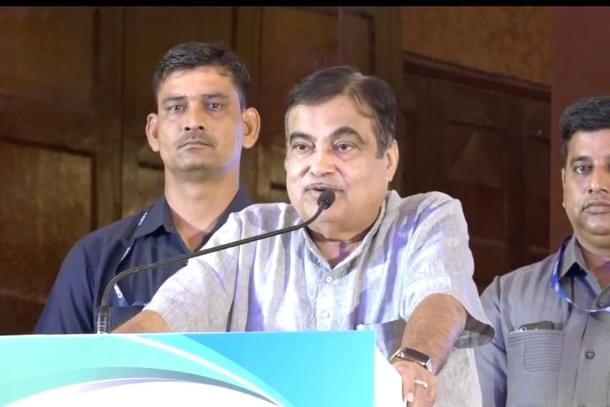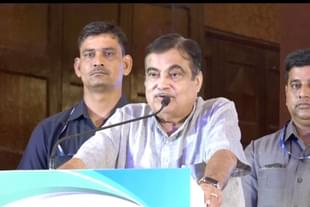Business
Amid Rising Fuel Import Bill, Gadkari Pitches For Diversifying Agriculture Sector Towards Energy And Power Sectors
Swarajya Staff
Aug 27, 2022, 03:58 PM | Updated 03:58 PM IST
Save & read from anywhere!
Bookmark stories for easy access on any device or the Swarajya app.


Union Road Transport and Highways Minister Nitin Gadkari on Saturday (27 August) stressed on the need to reduce sugar production and instead diversify the agriculture towards energy and power sectors to reduce country's fuel import bill.
While addressing the addressing the felicitation programme of National Cogeneration Awards 2022 in Mumbai, Gadkari said that over production of sugar is a problem for the economy.
Highlighting that India spends Rs 15 lakh crore per year for import of petroleum products, Gadkari stressed on the need to diversify the agriculture sector toward energy and power sectors.
The Minister exhorted the industry of the crucial need to focus on alternative fuels with the help of futuristic technologies.
“While 65-70 per cent of our population depends on agriculture, our agricultural growth rate is 12-13 per cent only; the sugarcane industry and farmers are a growth engine for our industry. And the next move should be cogeneration to increase revenue from sugar," the minister said.
"The industry should produce less sugar and produce more byproducts, embracing the vision for futuristic technologies and using the power of leadership to convert knowledge into wealth," he added.
This will enable the farmers to become not only food growers, but energy producers as well, he said.
He said that while India's requirement was 280 lakh tonnes of sugar this year, the production was more than 360 lakh tonnes and this could be utilised due to the situation in Brazil.
It should be noted that due to this year's low production in Brazil, the largest sugar producer globally, India's sugar exports are expected to increase to around 9-10 million tonnes in sugar season 2022, surpassing the previous high of 7.2 million tonnes in the sugar season 2021.
However, we need to divert production towards ethanol as the ethanol requirement is very high, the minister pointed out.
“Last year's capacity was 400 crore litres of ethanol; we have taken a lot of initiatives to increase ethanol production. Now is the time for the industry to plan demand for ethanol, using technologies such as power generators run by bioethanol," he said.
The minister told the industry that the government has decided to launch flex engines in India.
“Bajaj, Hero and TVS are already making flex engines, many car manufacturers too have promised to launch their models on flex engines," he said.
The Minister informed how a crucial problem on the calorific value of ethanol has been addressed in discussion with researchers from Russia.
“Calorific value of ethanol was less, 1 litre of petrol equaled 1.3 litre of ethanol, but using Russian technology, we have found a way to make the calorific value of ethanol the same as that of petrol," the minister said.
He informed that even auto-rickshaws can be run on bioethanol and in the construction equipment industry too, alternative fuels can be used.
Similarly, Germany has proven technology to run trains on bio-ethanol.
A highly purified version of ethanol can also be used in the aviation industry and the aeronautical sector is doing research on how this can be done, he added.
“Bio-CNG is way cheaper than CNG and can be made from rice straw and even from organic municipal waste, making it economically attractive," he said.
The Minister reminded the industry that there is scope of using harvesting technologies for cutting of sugarcane.
“Harvesting machines can use ethanol as a fuel, making the circular economy possible," he said.





